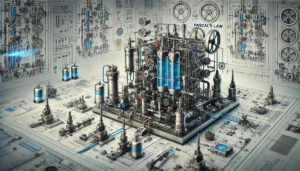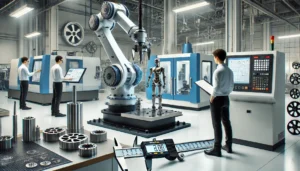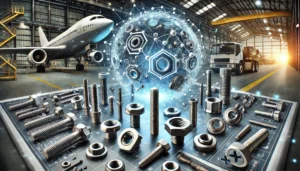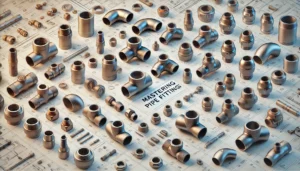In the modern era, waste has to be taken care of in a systemized way and it goes beyond legal restrictions. It has to ensure that it is part of the sustainable business ecosystem. Since industries throw away different types of wastes in large quantities, effective industrial waste management is very crucial. Although difficult, there are promising new solutions provided through advanced industrial equipment and technology innovations.
An example is Induskart, which serves an important purpose in this context. They supply a vast range of industrial equipment like new age tools and advanced machinery, enabling industries to enhance their waste management practices. Incorporating new technologies and better practices enables companies to improve their waste management activities, which positively impacts the environment and society.
2. The Importance of Industrial Waste Management
This is a problem of great relevance for different aspects of our world. Now let’s explain its importance:
Environmental Impact:
- Pollution: If industrial waste is not disposed of properly, it can cause serious environmental pollution.
- Resource Depletion: Poor waste management practices lead to reckless consumption of natural resources.
- Ecosystem Damage: Waste is hazardous to both land and water ecosystems.
Economic Implications:
- Cost of Waste: Inefficient waste management increases operational costs.
- Recycling and Recovery: Efficient waste recycling has economic gain through material recovery.
- Job Creation: Improved waste management practices create jobs in waste processing and recycling.
Health Concerns:
- Public Health Risks: Exposure to hazardous industrial waste presents serious health risks.
- Worker Safety: Proper waste management guarantees safety and health of workers in the sector.
Every industry is important in creating a more sustainable world. For example, by purchasing advanced waste management equipment from Induskart, businesses can enhance their working environment by eliminating hazardous waste like industrial waste showers, and at the same time, boost economic productivity.
3. Overview of Different Waste Management Methods
Industries employ different methods in waste management, and this guide will showcase the most common ones:
Landfilling:
- Traditional Approach: It is the most widely practiced waste disposal method, where waste is buried beneath the surface.
- Drawbacks:
- Environmental Impact: Contaminated groundwater and emission of greenhouse gasses.
- Space Constraints: Significantly large land area, which is becoming increasingly scarce, is required.
- Limited Lifespan: Over a period of time, Landfills can become unsustainable as they have a fixed capacity.
- Recycling:
- Resource Repurposing: Activities or processes aimed at transforming waste into new products in order to prevent the wastage of potentially useful resources.
- Benefits:
- As a result of repurposing resources, the need for extraction of new materials is eliminated, hence conserving more natural resources.
- Contribution to energy conservation, resulting in greenhouse gases emissions that are lower in comparison to making new products.
- Promotion of circular economy by making sure resources are not wasted and are instead used for the greatest purpose throughout the duration of time.
Incineration:
- Waste-to-Energy Process: The burning of waste at high temperatures for the purpose of generating energy.
- Environmental Considerations:
- Significantly reduces the overall amount of waste.
- The burning of waste does create concerns about air pollution and toxic emissions though modern plants with pollution control technologies do have these concerns.
Composting:
- Organic Waste Management: The method works for biodegradable organic waste like scraps of food and garden waste.
- Advantages:
- The compost is nutrient rich and helps assist in soil health.
- Reduction of methane gas emissions from landfills and reduces the carbon footprint.
4. Technological Innovations in Waste Management
The invention of new technologies has dramatically improved these processes, increasing efficiency and sustainability in waste management.
Internet of Things (IoT):
- Smart Waste Management: Enables motorized bins to have a sensor, making them able to know when they are full, which can limit the need to pick them up until they are at a certain waste level.
- Benefits:
- More efficient collection of waste.
- Lowering the operational costs as well as the amount of pollutants emitted by waste collection vehicles to the environment.
Artificial Intelligence (AI):
- Automated Sorting and Processing: AI-driven machines can sort waste more accurately and quickly than manual sorting.
- Advantages:
- Enhances recycling rates.
- Reduces human error and increases processing speed.
Advanced Machinery:
- Induskart’s Relevance: They supply a range of machinery that can aid in efficient waste processing and management.
- Impact:
- Streamlines waste processing operations.
- Improves safety and efficiency in waste handling.
5. Case Studies or Examples
There are numerous and varying examples that showcase the impact of proper waste management practices within an organization. Below are just a few examples:
Example 1: Recycling in the Manufacturing Industry
- Company: A leading manufacturing firm (potentially a client of Induskart).
- Practice: Put in place a scrap materials recycling program.
- Outcome: Achieved a reduction in landfill waste by 30% while recovering useful materials.
Example 2: Composting in the Food Industry
- Company: A prominent food processing company.
- Technique: Implemented an organic waste composting initiative concerning food waste.
- Result: Diverted more than 60% of their organic waste from landfills thereby enriching local farmland soil.
Example 3: Advanced Waste Processing in Petrochemicals
- Company: A petrochemical giant, potentially using advanced tools from Induskart.
- Method: Integrated the use of high-efficiency incinerators together with pollution control technology.
- Impact: Reduced hazardous waste to the minimum level while generating energy and meeting environmental standards.
These cases provide Induskart with ample opportunities to illustrate how suppliers equipment and tools can aid in waste management across various sectors.
6. Challenges in Industrial Waste Management
Despite advancements, several challenges persist in industrial waste management:
Regulatory Compliance:
- Navigating complex and ever-changing environmental regulations.
- Ensuring adherence to local and international waste management standards.
Technological Barriers:
- Integrating advanced waste management technologies.
- Keeping up with technological advancements and training staff accordingly.
Cost Implications:
- High initial investment for state-of-the-art waste management systems.
- Balancing cost-effectiveness with environmental responsibilities.
Induskart can play a crucial role in overcoming these challenges:
- Product Range: Offering a variety of tools and equipment that meet regulatory standards and enhance waste management efficiency.
- Technical Support: Providing expertise and advice on the most suitable products for specific waste management needs.
- Cost-Effective Solutions: Supplying a range of products that cater to various budgets, without compromising on quality or compliance.
7. Best Practices for Industries
Industries looking to improve their waste management can adopt several best practices to ensure efficiency and sustainability:
Conduct Waste Audits:
- Regularly assess and monitor waste streams to identify reduction opportunities and optimize waste handling.
Employee Training and Awareness:
- Educate staff about the importance of waste management.
- Implement training programs to ensure proper waste handling and segregation.
Invest in the Right Equipment:
- Utilize advanced tools and machinery for effective waste processing and recycling.
- Consider products from companies like Induskart for reliable and efficient solutions.
Implement a Recycling Program:
- Establish clear recycling policies and procedures.
- Set up designated recycling areas and bins for different types of waste.
Partner with Waste Management Experts:
- Collaborate with professional waste management services for expert guidance and efficient handling of waste.
Embrace Technology:
- Utilize technological innovations like IoT and AI for smarter waste management solutions.
Review and Improve Continuously:
- Regularly evaluate waste management practices.
- Adapt and improve strategies in response to changing regulations and technological advancements.
8. Conclusion
Industries need to change their approach to waste management. Adopting effective techniques while leveraging technology helps manage industrial waste responsibly. As discussed, these innovations are essential for a more sustainable environment.
All industries must work towards optimizing their waste management policies, keeping in mind the consequences for the environment, economy, and public health. Through the use of proper tools and modern equipment, or by conducting technological waste audits, industries can attain higher levels of sustainability in waste management.
We highly recommend that all industries make the best use of the tips provided above and look at the wider options provided by some companies such as Induskart that can help with their products and skills in these regards. Do not forget that responsible waste management is not only a legal requirement, but also a promise towards the future of humanity.










